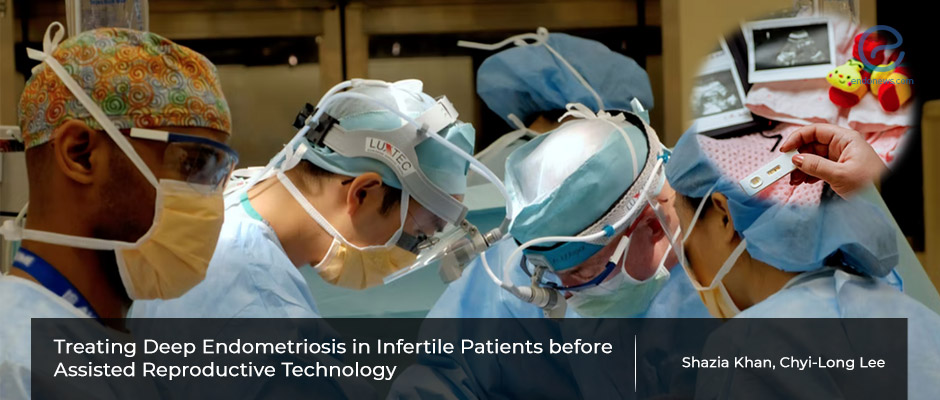Surgery before in-vitro fertilization – Is it beneficial in patients with deep endometriosis?
Mar 15, 2022
Recommendations from the medical societies have caused debates on the benefits of surgical intervention before in-vitro fertilization in deep endometriosis patients
Key Points
Highlight
- Patients who suffer from infertility should be evaluated individually when deciding on surgical intervention for deep endometriosis.
- Patient history, clinical examination, and the skills of the surgeon play pivotal roles.
- Benefits from surgical interventions have been shown when performed on the right patients.
Importance
- The presentation of deep endometriosis may be different for each patient and the damage caused by the extent of the disease should be assessed before any intervention is performed.
- Infertility caused by endometriosis is multifactorial and not only the result of its deep localization.
What's done here
- Authors from India and Taiwan published a perspective article aiming to find evidence about the effects of deep endometriosis on fertility and pregnancy and the advantages of performing surgery before in vitro fertilization.
- All the articles in the literature about deep endometriosis, fertility, and pregnancy were searched in the database and evaluated.
Key results
- Multiple factors such as adhesions, endometriotic implants, ovarian endometriomas, adenomyosis, and immunological factors are responsible for infertility in patients with deep endometriosis.
- The aim of deep endometriosis surgery should be to maintain normal pelvic anatomy in order to increase the pregnancy outcomes.
- In patients with higher stages of the disease, a laparoscopical approach is recommended.
- Extensive surgeries are shown to have higher complication rates.
- Some studies show conflicting results with better pregnancy rates in times when more lesions are removed during surgery.
- In-vitro fertilization is recommended as the first option for recurrent endometriosis.
Lay Summary
Deep pelvic endometriosis is thought to be related to infertility by altering the pelvic environment and anatomy due to pelvic adhesions, and the changes in endometrial receptivity contribute to it. The discussion on whether the surgical intervention was beneficial started when the European Society of Human Reproduction and Embryology and the European Society of Gynaecological Endoscopy stated that the resection of deep endometrial nodules did not ameliorate the fertility outcomes.
Drs Khan and Lee from India and Taiwan conducted a review study to find evidence about the effects of deep endometriosis on fertility and pregnancy and the advantages of surgery before in vitro fertilization treatment which was published as a perspective article in the November issue of the journal Gynecology and Minimally Invasive Therapy. After reviewing the articles, the authors state that there is not enough evidence to support the idea that deep endometriosis causes infertility; it rather impairs it with multiple factors. These factors include adhesions, endometriotic implants, ovarian endometriomas, adenomyosis, and immunological factors. Endometriosis itself causes altered endometrial receptivity, reduced ovarian reserves, and decreased implantation rates.
It is reported that surgery for deep endometriosis should be performed with the aim of maintaining normal pelvic anatomy to increase the chances of implantation. A laparoscopic approach is recommended to increase spontaneous pregnancy rates in patients with Stage III/IV endometriosis who have infertility. With multifocal and extensive disease, it is hard to assess the effect of surgery as randomized controlled trials are lacking on this subject. One study showed that extensive surgery for deep and intraperitoneal endometriosis had a higher complication rate. In other studies, the pregnancy success rate after surgery depended on the lesion size, number, and location. The more lesions were removed, the higher pregnancy rates were achieved. Laparoscopic surgery was found to be more advantageous to diagnostic laparoscopy. Time to conception after surgery and surgeon skills are also deemed important.
It is reported that when looking for the benefits of surgery before in-vitro fertilization, the essential points to remember are the importance of patient history, clinical examination, and correct evaluation of deep endometriosis symptomatology. A multidisciplinary approach is crucial when trying to maintain normal pelvic anatomy, and bowel and urinary complications should be foreseen. The decision to undergo surgery should be decided separately for each patient depending on disease severity and other factors such as age, previous treatments, localization, etc. In-vitro fertilization is reported to be the first option in cases of recurrent endometriosis. Benefits of surgical therapy for endometriosis-related infertility have been shown when suitable patients are chosen for surgical intervention.
Research Source: https://pubmed.ncbi.nlm.nih.gov/34909375/
endometriosis deep endometriosis deep endometriosis surgery pregnancy fertility in-vitro fertilization stage III/IV

